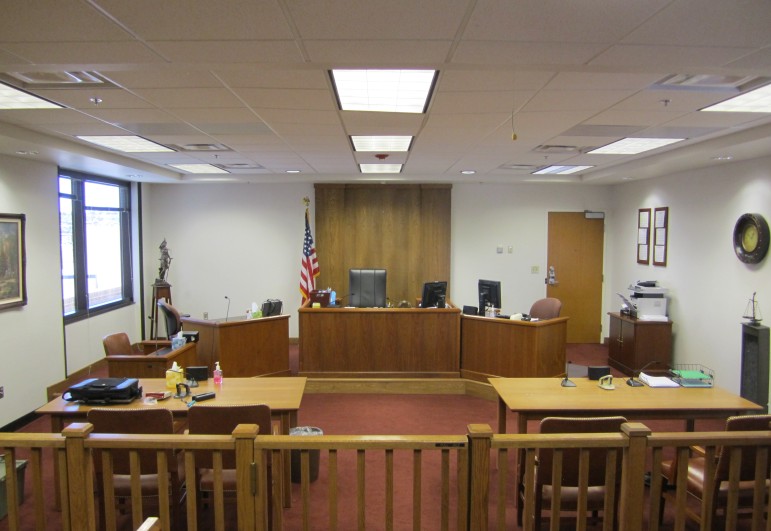
Kit Johnson
An immigration courtroom in Texas.
According to TRAC, about three-quarters of unaccompanied minors who began proceedings in the 2017 fiscal year still lack representation. As in New York City, the rate of representation has decreased significantly in the past three years at the nation’s next four busiest immigration courts in Los Angeles, Houston, Arlington and Miami.
The declining rate of representation for children in
| Fiscal Year | Los Angeles | Houston | Arlington | Miami |
| 2016 | 73% | 52% | 73% | 61% |
| 2017 | 25% | 22% | 13% | 25% |
| 2018 | 14% | 25% | 23% | 29% |
(Source: Data compiled by the Syracuse TRAC using information acquired through FOIA requests from EOIR, as of December 2017)
Meanwhile, children and adults are appearing on the same court dockets before judges with little experience presiding over children’s cases, lawyers from Houston and Los Angeles say.
“In Houston, we are seeing the juvenile dockets are not remaining 100 percent juvenile,” says Claire Doutre, the managing attorney at the Kids In Need of Defense (KIND) office in Houston. “We are also seeing a lot more judges who are hearing mixed dockets. The majority are adults and a handful of children.”
For years, Doutre says, the dockets remained separate and proceedings generally occurred at specific times of the day.
In Los Angeles, three judges continue to preside over most juvenile dockets, but there have been “a few outliers where unaccompanied children are mixed into adult dockets,” says Joanna Fluckey, Senior Direct Representation Attorney at the KIND office in Los Angeles.
Fluckey says attorneys at the Los Angeles courthouse have not been permitted to use empty spaces to meet with unrepresented children and that the mixed dockets foster an even scarier experience for children.
“The children have been traumatized in their home countries, traumatized by their journey and if they’re on the adult docket, they’re among very different types of cases,” she says. “It’s more frightening to be in that environment than one where the judge is able to maintain child-friendly practices throughout the docket.”
Like undocumented immigrant children in New York City, Fluckey says kids across the Los Angeles area have a tough time finding legal counsel and are left to figure out the chaotic system on their own.
“We are struggling to keep up with the needs of unaccompanied children and the risk to them is so high,” Fluckey says. “I don’t think a child could be expected to navigate court alone.”








3 thoughts on “NYC’s Immigration Court Erodes Accommodations for Children Without Attorneys”
Pingback: – Fewer Children Get Legal Help Fighting Deportation
the gaurds don’t stop probono or usher them out of the court when trying to meet with the respondent. they clear the hallways.beacuse the attorneys clutter the hallways with the respondents. Just Making a clearing for the judges and employees to pass. I know some attorneys have a hard time understanding it but its ok. the guards will continue to work with them
Pingback: The Door Recognized in City Limits Article | The Door